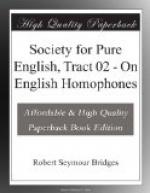This discrepancy might be overcome by the use of what are called ‘diacritical’ marks, but here the universal prejudice against accents in English is forbidding, and it is true that even if printers did not rebel against them, they are yet distasteful and deterrent to readers out of all proportion to their complexity.
[Sidenote: The result of Mr. Jones’ solution.]
[Sidenote: The true condition of modified vowels, &c.]
Mr. Jones no doubt allowed himself as much liberty as he could venture on, but to what has this paucity and choice of symbols led him? It has led him to assert and teach that an unaccented vowel in English retains no trace of its proper quality[27]: that is, that you cannot, or at least do not, modify an unaccented vowel; you either pronounce a, e, o, u, distinctly, or you must substitute an alien sound, generally ‘er’, or in some consonantal positions a short ‘i’. Thus we have parersite, oblerquy, ikse’pt, ikspre’ss, iqua’ter, peri’sherner, perli’ce, spe’sherlize, pin’erkl, Mes’esperta’mier, &c., and one of his examples, which he advances with the confidence of complete satisfaction, is the name Margate, which he asserts is pronounced Margit,[28] that is, with a short i. The vowel is no doubt short, and its shortness is enforced by its being closed by a t: but it is not a short i, it is an extremely hastened and therefore disguised form of the original and proper diphthong ei (heard in bait and gate); and the true way to write it phonetically would be ei, with some diacritical sign to show that it was obscured. There is no long vowel or diphthong in English which cannot in some positions be pronounced short; and when hurried over between accents it is easy to see that there is nothing, except an obstacle of consonants, which can prevent the shortening of any syllable; for long and short are relative, and when you are speaking very slowly ‘short’ sounds actually occupy as much time as ‘long’ sounds do when you are speaking quickly. You have therefore only to suppose a speed of utterance somewhat out of scale; and this is just what happens. In the second syllable of Margate the diphthong is hastened and obscured, but a trace of its quality remains, and will more distinctly appear as you speak the word slower. And so in the case of unaccented short vowels that are hurried over between the accents in talking, they are disguised and lose quality, but in good speakers a trace of the original sound will remain (as in parasite and obloquy), where, on the ground of indistinctness, Mr. Jones introduces the symbol of an alien unrelated sound, a sound, that is, which is distinctly wrong instead of being indistinctly right: and this fault vitiates all his books. Economy of symbols has led him to perversity of pronunciation.[29]




